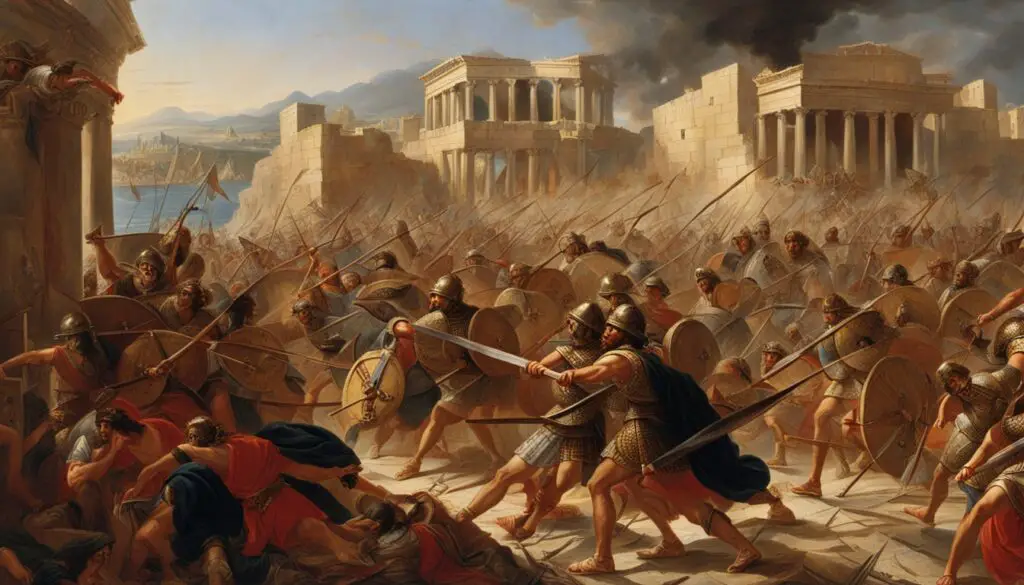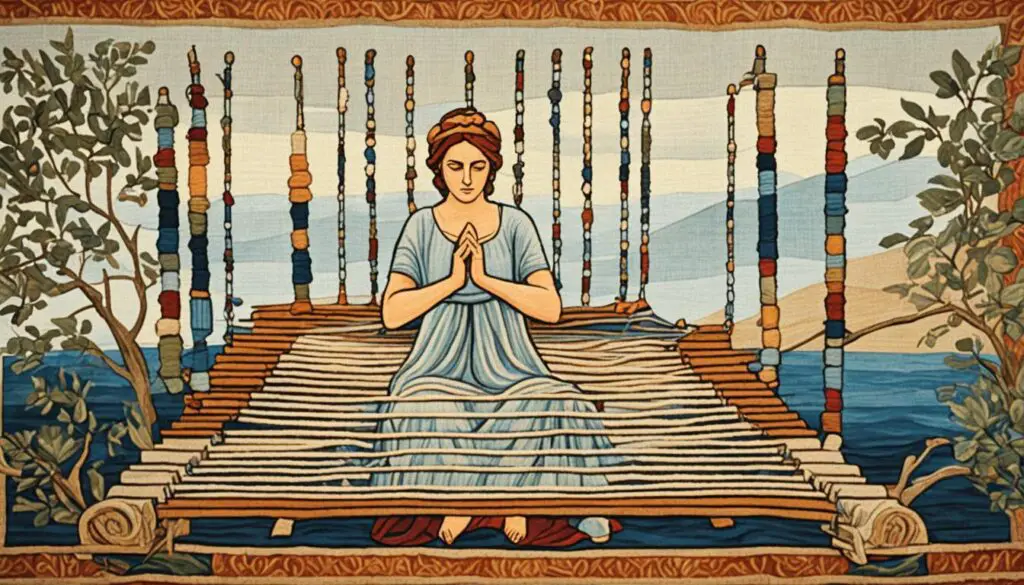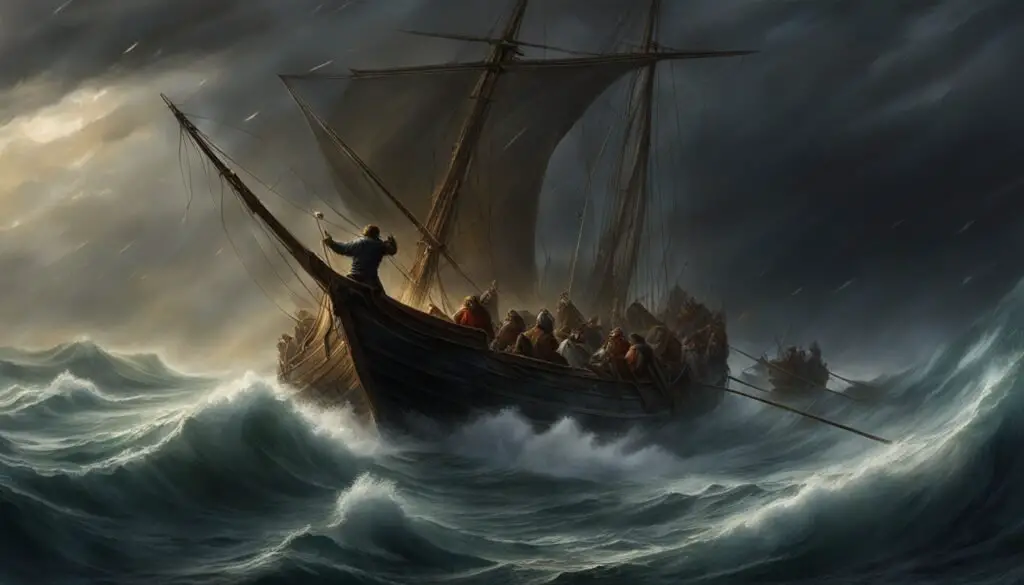Odysseus was a Greek king from Ithaca. He’s a big deal in Greek myths and Western culture.
He’s praised for being very smart, tricky, and able to do many things. His journey back after the Trojan War was super hard, taking ten years.
All this was written in Homer’s famous book, the “Odyssey.” In stories from ancient Rome and Greece, he’s also known as Ulysses.
People remember him for his adventures and clever solutions. He shows us how important it is to keep fighting, no matter what.
Key Takeaways
- Odysseus is the legendary Greek king of Ithaca.
- Known for his intellectual brilliance and versatility.
- Odysseus’s journey home post-Trojan War lasted ten years.
- In Roman mythology, Odysseus is called Ulysses.
- His story is central to Homer’s epic poem, the “Odyssey.”
Introduction to Odysseus
Odysseus is a key figure in Greek myths, known for his smart mind and strong body.
He’s the King of Ithaca in Homer’s “The Odyssey,” a famous work with 24 books.
This epic was penned between 725–675 BCE. It tells of Odysseus’ journey back home after fighting in the Trojan War, a trip that proved his legend.
“The Odyssey” has 12,109 lines and is written in a special way called dactylic hexameter.
From ancient times until the 15th century, this story was shared by hand in Greek. But the first printed Greek text in Florence in 1488 changed everything.
Soon, it was translated into other languages and became a hit across Europe, affecting a lot of literature.
Odysseus meets many famous figures on his adventure, like Nestor and Agamemnon. He shows his cleverness many times, like with the Trojan Horse.
This trick allowed him to get Achilles’ special armor. It was a big deal among the Greek fighters.
In Greek stories, Odysseus is seen as a smart and brave leader. He faces challenges from gods and monsters with his wits and courage.
There are many old artworks and stories telling about his adventures. These show how his legend has lasted through time.
Around the late 8th century BCE, Greek culture saw a big growth and spread. They settled in places from Libya to Southern France.
“The Iliad” and “The Odyssey” became basic texts in Greek and Roman schools. They are linked to the poet Homer.
However, some people, like Samuel Butler, think a woman might have actually written these amazing tales.
The Early Life of Odysseus
Odysseus was born to King Laertes and Queen Anticlea of Ithaca. His family line was full of Greek nobility and divine heritage. Hermes was his ancestor on his mother’s side, through Autolycus.
This connected Odysseus to blessings and curses from the gods, starting his grand adventure.
Birth and Family
Ithaca, Odysseus’ home, was more than a kingdom. It was a rugged place that symbolized his strong roots.
His parents, Laertes and Anticlea, guided him in the ways of Greek nobility. Their connection to the gods meant Odysseus faced both dangers and miracles.
Odysseus’ Youth
Not much is known about Odysseus’ early years, but they helped him grow into a cunning and skilled man.
From youth, he showed brains and was a problem-solver. His grandfather Autolycus taught him trickery, which was key to surviving in ancient Greece.
As a young man, Odysseus was great at sports like archery. These skills were important in his adventures and battles.
His early life taught him to be tough and think smart, making him a legendary hero.
Who Was Odysseus According to Greek Mythology?
Odysseus stands as a key player in Greek myths, famous for his part in the Trojan War and his adventurous journey home.
As king of Ithaca, his cleverness and quick thinking earned him the title “Odysseus the Cunning.”
He’s at the heart of many legendary stories, marking him as the main hero of the Odyssey.
In the Trojan War, Odysseus showed his smarts and creative thinking. He tried to avoid fighting by acting mad.
But when Palamedes uncovered his act, he joined the Greek forces. There, he showed his brilliance by getting Heracles’ dangerous arrows and capturing the prophet Helenus.
One of his most famous achievements was coming up with the idea of the Trojan Horse. This plan led the Greeks to victory.
They hid in a huge wooden horse and surprised the Trojans, causing the city to fall. This made Odysseus the symbol of intelligence and wisdom, according to Greeks.
After the war, Odysseus faced many dangers on his way home. His journey was full of peril, from facing the Cyclops to escaping the Sirens’ songs.
These adventures showed his strong will and courage.
In Ithaca, Odysseus’ wit was crucial again. He outsmarted the suitors who wanted his wife. This event underlined his intelligence and determination.
Homer’s stories paint Odysseus not just as a warrior but as a man of great intelligence and will.
His adventures are still celebrated today as a story of cleverness, bravery, and resilience.
Odysseus and the Trojan War

In the epic Iliad, Odysseus stands out as a key figure. He is known for both his great thinking and his fighting.
He often helped the Greeks by giving good advice to the ruler, Agamemnon, during the Trojan War.
This helped boost the Greek soldiers’ spirits and plans in Troy.
The Role in the Iliad
In Homer’s Iliad, Odysseus is seen as a chief both in talks and in the field. The Greek troops respect him a lot (Iliad 2.294-6).
He fights bravely, and Athena, the goddess of war, looks after him. He leads in bold night missions and tries to make peace between groups of Greek fighters who are upset with Agamemnon.
Odysseus was very smart in the Trojan War. He came up with many plans that changed the battles.
For example, he acted madly to avoid fighting, got Achilles to join, and thought up the Trojan Horse.
He even did sneaky missions like catching Dolon, finding things out from him, and then silently killing the enemy.
His cleverness is also seen when he managed to return Chryseis and checked the Trojans with Diomedes.
Even though he wasn’t the best fighter, Odysseus was still very strong and smart. He is considered one of the best Greek heroes from the Trojan War.
His mix of cunning mind and fight skills made him well-known. This is why his story of getting back home is told in the Odyssey.
The Journey Home: The Odyssey
Homer’s epic follows the story of Odysseus after the Trojan War. He travels for ten years to get back to Ithaca.
This adventure is full of dangerous seas and an uncertain destiny. It shows Odysseus facing many challenges.
Adventures and Challenges
Odysseus’ journey is filled with difficulties. He starts with 12 ships, but only one remains due to bad winds.
After landing on Calypso’s island, he plans his escape for seven years. Each part of the journey tests his intelligence and courage.
He meets the Sirens, the cruel Cyclops, and other dangers. The kindness of the Phaeacians and the cruelty of the Laestrygonians show the wide range of challenges he faces.
These events highlight his perseverance and cleverness.
Nostos: The Homecoming
Nostos means the hero’s return in Greek. For Odysseus, it is a journey of survival and self-discovery.
He proves his right to be king and his love for his family. He remains loyal despite losing his crew and ships.
This story tells of Odysseus overcoming both men and gods’ challenges. He finally reunites with his family in a touching end. His journey back is not just about finding his home but also about his unbreakable spirit.
Anyone can explore the deeper meanings of “The Odyssey” through resources like The Odyssey. It’s a rich study for scholars and fans of literature.
Encounters with Mythical Creatures
Odysseus met many monstrous confrontations on his epic journey. These tests challenged his mind and spirit.
A key moment was his battle with Polyphemus, the one-eyed Cyclops.
The Cyclops Polyphemus
In the Odyssey, Odysseus faces off against the terrifying Polyphemus. This cyclops eats some of Odysseus’ crew.
But Odysseus, being very clever, outsmarts him. He blinds Polyphemus with a wooden stake, saving his men and himself.
This story shows how brains can beat brawn, even against monstrous foes.
Sirens, Scylla, and Charybdis
Next, Odysseus deals with the Sirens, who sing songs luring sailors to their doom. He outsmarts them too.
He has his crew put in earplugs and ties himself to the mast. This way, he hears their song but remains safe.
He also faces the dangers of Scylla and Charybdis, a six-headed monster and a deadly whirlpool. In a tough choice, he picks the lesser evil.
This sad choice teaches us about the tough decisions leaders have to make sometimes.
Odysseus’ bravery, leadership, and cleverness shine in every challenge. His story teaches us about overcoming difficult odds and staying strong in hardship.
The Influence of the Gods
The gods heavily influenced Odysseus’ epic journey. Poseidon, the sea god, was especially angry with Odysseus.
This was because Odysseus had blinded Poseidon’s son, the Cyclops Polyphemus.
Poseidon’s Wrath
Odysseus faced Poseidon’s anger, impacting his adventure greatly. In Homer’s Odyssey, Poseidon’s rage caused endless storms and hardships for Odysseus.
Odysseus’ troubles grew as he tried to make things right with Poseidon. Overcoming the wrath of the sea god made his journey much harder.
Athena’s Guidance
Athena, goddess of wisdom and battle, contrasted sharply with Poseidon. She greatly helped Odysseus on his journey.
Her wisdom guided him through every difficulty.
Her support took many forms, protecting Odysseus and helping him strand challenges.
This shows the caring side of the gods, balancing Poseidon’s anger.
The role of the gods in Odysseus’ life is vital. Poseidon’s punishments made Odysseus’ trials harder.
But Athena’s help was key to Odysseus’ success at last. This highlights how crucial the gods’ support was during his journey.
Odysseus’ Relationships

Odysseus is known for his journey and the relationships he had. The most standout one is with Penelope, his wife.
Penelope stayed true to him for 20 years. She did this by tricking the wooers. Each night, she would undo a part of her weaving.
This showed her faithfulness and wit even when many men wanted to marry her, some of whom were mean.
She waited patiently for Odysseus to return. This shows true love can overcome many challenges.
Telemachus: The Loyal Son
Telemachus showcases a strong bond with his father. As Odysseus’ son, he grew from a boy to a man.
His journey to find his father and help him fight the suitors showed his loyalty and courage.
This father-son bond adds to the story’s themes of legacy, family loyalty, and growth.
Circe and Calypso: Lovers and Captors
During his adventure, Odysseus had relations with Circe and Calypso. They kept him enchanted for many years.
Odysseus spent one year with Circe and seven with Calypso. This signifies Odysseus’ struggle between his heroic duties and being seduced by beautiful women.
Yet, his desire to return home and be with Penelope remained strong.
Learn more about the characters that made Odysseus’ story unique. The characters’ relationships add depth to the themes of loyalty, family duty, and the human experience.
The story of the Odyssey is not just about Odysseus’ adventures.
It highlights the importance of family and reunion. Recognizing each other after many years shows the power of family ties.
Encounters with gods like Athena made the story more complex. The interactions between mortals and gods enriched Odysseus’ journey.
The Heroic Traits of Odysseus
Odysseus stands out as a unique hero in Greek myths. He’s known for his smart thinking more than his strength.
Many call him the wily protagonist and the scheming hero.
Cunning and Resourcefulness
Odysseus is smart and quick to act, especially in tough spots. He used his mind to win against powerful foes.
His smart move with the Trojan Horse and handling monsters show his wit. In The Odyssey, he faces many challenges.
He uses logic and clever plans to get through, proving he’s a great thinker.
- In the Cyclops episode, Odysseus opts to wound Polyphemus rather than kill him, ensuring his crew’s escape.
- He restrains himself by the mast to resist the enchanting Sirens, demonstrating his strategic mind and self-discipline.
- Sending only three men to investigate the Lotus-eaters reflects his strategic decision-making.
Endurance and Courage
Odysseus showed amazing strength and bravery during his tough journey. His quest home proves his incredible will and courage.
- Odysseus’ containment of his curiosity when encountering the Cyclops underscores his mental strength.
- His navigation through storms and mythical threats reflects his status as a brave warrior.
- Oddyseus’ display of loyalty in saving his crew from the Lotus-eaters, despite the dangers involved.
In Odysseus’s world, being smart was as important as being strong. His story highlights his brave and clever nature.
He’s still celebrated as a hero today for these qualities.
The Legacy of Odysseus in Literature

The figure of Odysseus has undeniably left a significant literary influence across centuries. His cunning, adventurous spirit, and complex relationships are etched deeply within the fabric of literature.
Those familiar with Homer’s epic poetry understand that Odysseus’ 20-year journey away from home, as narrated in “The Odyssey,” highlights the theme of long journeys and perseverance.
His story is more than just an adventure; it’s about the power of talking and telling stories.
His talks with others, often pretending to be someone else, show how important it is to share our experiences and shape our stories.
This way of speaking, key in “The Odyssey,” has big cultural impact, teaching us how storytelling can bring us together and help us heal and grow.
During the COVID-19 pandemic, we’ve all felt alone and experienced tough times together.
This has shown us how much we need each other and how talking can help us understand and overcome these challenges.
Narrative therapy, a kind of psychology, says that telling our stories can change how we see the world.
This is a key lesson from Odysseus’ story of his adventures. It underlines the importance of knowing yourself and shaping your own story.
Think of it like how doctors treat the body and the soul. Today, with so many people forced from their homes, the quest for belonging and survival in “The Odyssey” is more relevant.
Modern works, like Emily Wilson’s 2017 translation and Madeline Miller’s “Circe,” provide new insights into these old themes.
As we keep reading about Odysseus, we see his lasting impact on literature. He shows us what it means to be a hero, the power of storytelling, and the yearning for home.
Common Epithets and Names
Odysseus was a prominent figure in epic poetry and myth. He received many titles that showed his qualities.
In the Odyssey, Homer highlighted his intelligence and ability to change in the face of adversity.
Polytropos and Polumetis
Polytropos means “man of many ways.” Polumetis stands for “many-minded.” These words express Odysseus’ smart nature and his ability to solve problems.
He was known for his hardship and patience, often called “much-enduring” or “man of twists and turns.”
To early thinkers, he appeared as a mix of wisdom, deceit, and cleverness.
Ulysses: The Roman Name
“Ulysses” is the Roman name for Odysseus. It shows how Odysseus’ tale spread into Roman stories, blending cultures. Ulysses became a key character in Roman tales.
This marked the beginning of his global legend, showing his intelligence and bravery.
The Moral and Philosophical Interpretations

Odysseus is often studied by many philosophical groups, making his legacy strong. He’s known for his smart political moves and his excellent leadership.
This has gained him a lasting reputation as an intellectual leader.
Odysseus as a Wise Statesman
Montiglio’s work shows us how Odysseus’ knowledge-sharing role was viewed. He was both highly praised and criticized for how he shared wisdom.
That study also compared his character to those of Socrates, Plato, and Aristotle, showing varying opinions.
Philodemus placed value in Odysseus’ mind over his physical skills. This ties Odysseus to the tradition of Socratic thought.
The Romans saw him as a model of political virtue, which shows his statecraft example.
Philosophical Views
The Cynics and Stoics had different views on Odysseus. Heraclitus thought Epicurus was too keen on Odysseus enjoying himself and singing.
Meanwhile, Philodemus made fun of Odysseus’ love for food. Still, Philodemus praised Odysseus for bringing order in the Iliad, highlighting his leadership qualities.
Philodemus shows how Odysseus is the focus of various morality and philosophy discussions. His character reflects different Hellenistic values.
This proves his importance in classical philosophical thought.
Plutarch’s works marked a change to praising Odysseus’ morals and skills. He highlighted Odysseus’ political sagacity.
Odysseus’ ethical and philosophical contributions still influence us today. He is key in understanding both utilitarian and deontological ethical theories.
Odysseus’ Legacy in Modern Culture
Odysseus has influenced today’s stories a lot, showcasing heroism and strength. His adventures have inspired many books and are written about in works like the Divine Comedy and Ulysses.
Through his intelligence, courage, and resilience, Odysseus is a model in literature. He encourages us to question society’s rules and to break free from them.
Influence on Modern Literature
Homer’s stories have had a big impact on literary works. His tales touch on deep themes like what’s right and wrong, and finding a balance between personal and social needs.
Characters based on Odysseus often show cleverness, knowledge, and strength. His legendary journey lives on in today’s stories, offering a new take on timeless adventures.
Portrayals in Films and Media
Odysseus is also a key figure in movies and TV, shining as a cultural icon. He is portrayed as modern while keeping his original qualities of being smart, brave, and strong.
These movies and shows let people today connect with his story in a meaningful way. His tales in modern media keep on inspiring and teaching us moral lessons.
Conclusion
The story of Odysseus is much more than a tale; it’s a deep look into what makes a hero. Spread over 24 books, it shows his struggles and wins.
From being trapped for years to facing tough choices on island after island, his story touches us all. It speaks to our never-ending need to find who we are and our place in the world.
Odysseus’ impact goes beyond his deeds. His son, Telemachus, looking for him, and his epic fight with the suitors are stories we all can learn from.
These tales connect to us, mixing gods, mythical beasts, and the importance of a homecoming. They show the power humans have to overcome odds and find solutions to any problem.
In the myth, Odysseus is more than a clever warrior; he’s a study of the human spirit. His story tells of his courage and mistakes.
These conflicts make him someone we can understand and get inspiration from. As stories change over time, what we learn from Odysseus remains vital.




